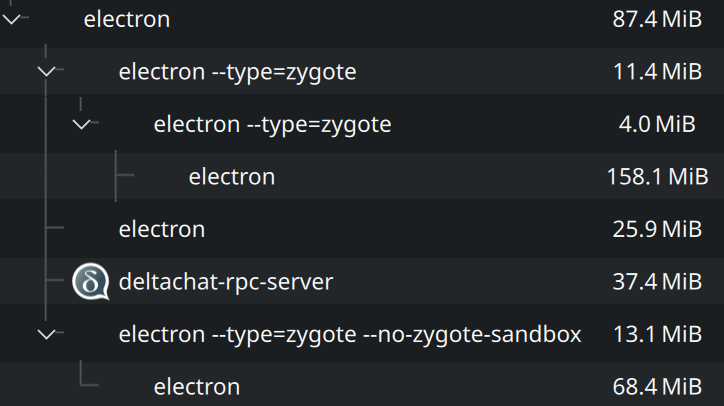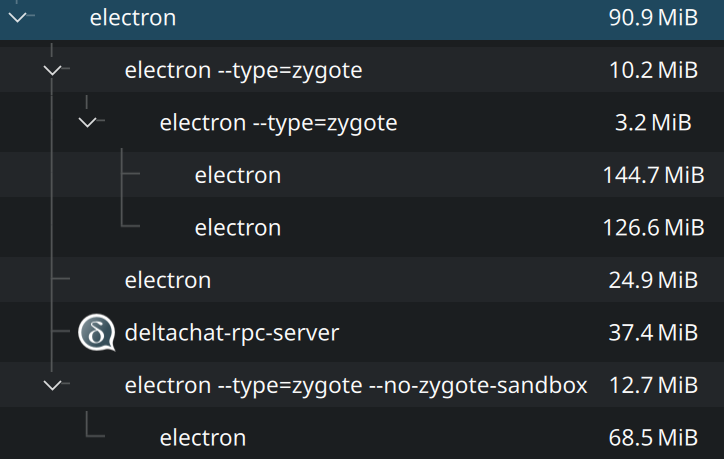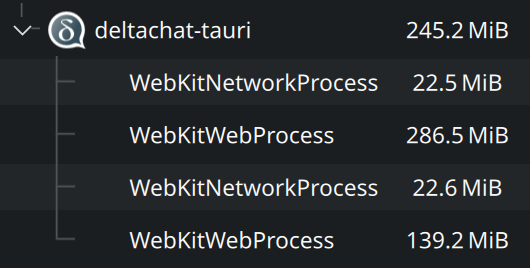DeltaTauri – Porting Delta Chat Desktop to Tauri.
July 20, 2025 by treefit, WofWca, septias, nojisan
There are quite some opinions floating around that Electron apps are bad because they “waste” too many resources. Which is understandable in theory, because Electron is basically a whole Chromium browser plus Node.js runtime in a package, in addition to your app. So it’s no surprise that even a hello world app in Electron can already be around 80 MB in download size.
But foremost, what even is Electron? Electron is a framework that makes it easy to build cross-platform apps, meaning you write your code once and it runs on all 3 major platforms (Linux, macOS, and Windows). With Electron, you write your app like you would write a web app. Many modern and popular applications are made with Electron: Discord, Slack, MS Teams, VSCode, 1Password, Obsidian and Signal, to name a few. Other apps like Spotify and Steam also embed a Chromium browser for parts of their user interface.
Tauri is a relatively new alternative to Electron. Tauri promises smaller builds and a more advanced security concept compared to Electron. Like our core library, Tauri is also written in the memory-safe language Rust.
Our Journey
The idea of porting Delta Chat Desktop to Tauri intrigued us for some years now, but at the time our code still depended very heavily on Electron, so we took small steps in making our code more modular by starting the Runtime interface and the JSON-RPC API. The project picked up more speed at the beginning of 2024 when we got NLnet funding for the project, which we named “DeltaTauri”.
We started in May with packaging the JSON-RPC over StdIO server as an npm package (@deltachat/stdio-rpc-server) and using that for the Electron version instead of the old npm package, which still utilized the Node-API and CFFI. The JSON-RPC vs. CFFI blog post goes into more details on this.
The project picked up steam in September: treefit started to reorganize the folder structure of the Delta Chat Desktop repository to turn it into a monorepo1. The new folder structure splits up the desktop client into smaller more modular packages:
├── packages
│ ├── e2e-tests # Integration tests
│ ├── frontend # The React based UI
│ │ # and most of the app's Logic
│ ├── runtime # Runtime Interface
│ ├── shared # shared types and constants
│ ├── target-browser # Browser Edition
│ ├── target-electron # Electron Edition
│ └── target-tauri # Tauri Edition
In October, we finished the Browser Edition, which serves as proof that the app reached independence of Electron and running in the browser helps with development: you get access to development tools and plugins of all browsers and a more reliable way to do integration testing. We wrote more about the browser edition in it’s blog post.
In November, Nico introduced automated end-to-end testing for Delta Chat Desktop with playwright, an industry standard tool for testing web-applications. This ensures the reliability of the app, each test can be thought of as a checkpoint. If a future change breaks the test, we get an alarm and can fix it before the new bug even reaches a test release.

In January we had Delta Chat Desktop running on Tauri, however the system integrations were still missing, which we then added in the following months.
Our experience with Tauri
Tauri has a very helpful community and our upstream contributions were accepted in a reasonable time, even though the Tauri project, like Delta Chat is currently also in a funding gap.
Now to the advantages that Tauri brought us:
- Easy to expand
- It’s written in Rust - memory safety and a strong type system gives you confidence to contribute.
- The Rust package ecosystem has many great systems API crates that work really well and are easy to integrate into Taui. In Electron using native apis that are not already implemented in Electron is much harder 2.
- Confidence to contribute:
- We can easily compile Rust for all platforms and also Tauri is small so it does not take hours or days to compile compared the beast of a C++ project that is chromium.
- It’s code base is relatively easy to grasp, because at it’s core it is “just” a web view wrapper instead of a whole browser fork with custom patches.
- Smaller package size (because it uses the system’s browser)
But it is not without its disadvantages: you suddenly have 2 different browser engines to optimize for (Chromium and WebKit3) and Tauri is much younger than Electron. While Electron has a fairly complete API out of the box, in Tauri you have plugins, but some Tauri plugins lack important functionality. Like in the notification plugin there is no way to listen for clicks on notifications (from Rust), so we made our own crate to directly interface with the system APIs.
Another point is compiling speed and cross-packaging for other platforms, both are faster on Electron because there you don’t need to compile code, just package it together. And of course Rust still takes its time to compible, which can be about 10-15 min (cold/full build) or much longer if you are using a slow computer.
Security
Tauri has really great security features, we used their capability system to restrict which window has access to which API calls. For example, webxdc windows can not access APIs meant for the main window, like changing settings:
identifier = "webxdc"
webviews = ["webxdc:*"]
permissions = [
"allow-send-webxdc-update",
"allow-get-webxdc-updates",
"allow-join-webxdc-realtime-channel",
"allow-leave-webxdc-realtime-channel",
"allow-send-webxdc-realtime-data",
"allow-register-webxdc-channel",
"allow-webxdc-send-to-chat",
]
You can find the capabilities for all windows at deltachat-desktop/packages/target-tauri/src-tauri/capabilities.
As someone who worked on the Tauri 2.0 audit, I appreciated the use of window capabilities to further sandbox webxdc apps.
We gave the sandboxing of webxdc apps special attention, because webxdc apps can run user defined code and we gave webxdc the strong privacy by prohibiting data ex-filtration over the internet. Fortunately Tauri has a reliable way to deny access to the WebRTC API on all platforms without the FILL500 hack (which we currently still use on Android and in the Electron edition).
Tauri does not have access to the file scheme in general, so we load all files over custom schemes that don’t allow arbitrary file system access:
dcblob://<account folder name>/<blob filename>
If you want to dive deeper, here is a list of the other security measures that we implemented: tauri-apps/tauri#5755 (comment)
The Differences
Tauri uses the Operating System’s webview for the frontend and native Rust code instead of a Node.js runtime for the backend.
This has the advantage of resulting in smaller binaries and install size. Additionally, the system webview is updated independently of Delta Chat, so security updates may reach the users faster - but only if they update their system.
But using the system webview can also be a disadvantage, in Electron we ship the webview/browser with the app, so we know exactly what version it has, in Tauri we do not control this aspect. The system webview also means we now have two target browser engines to work with: webkit on macOS and linux, and WebView2/chromium on Windows. If you are familiar with web-development then you already know that there are sometimes inconsistencies in how browsers behaves, what features and APIs they support and how they render style sheets.
Download and Installation Size
In the case of Delta Chat Tauri the download size was reduced by around 60-80% and the installation size was reduced by over 80% compared to the Electron edition. The size of the Flatpak download decreased, but the platform dependency increased by 54%, so the space-saving is not that huge, unless you also have other Flatpak apps using the gnome platform dependency.
You can find the data from our test on https://github.com/deltachat/deltachat-desktop/issues/5239.
RAM usage
Although Tauri is said to have big savings in RAM usage compared to Electron we didn’t find that in our project. This comparison is only about Delta Chat Desktop, you could see more benefits in your project.
| Electron (on Linux) | Tauri (on Linux) | |
|---|---|---|
| Processes: just main window |  |
 |
| Total: just main window | 405.69 MB | 634.7 MB |
| Processes: main window + webxdc app |  |
 |
| Total: main window + webxdc app | 519.09 MB | 716 MB |
| operating system & distribution format | Electron | Tauri |
|---|---|---|
| Linux: Flatpak | ~374-536 MB | ~347-380 MB |
| Linux: Debian | ~171.2 MB | ~493.7 MB |
| macOS | ~260 MB | ~326 MB |
| Windows | ~166 MB | ~211 MB |
Unfortunately RAM usage is not much less compared to Electron, often Delta Chat Tauri even uses more RAM than Electron.
State of Tauri Edition
The Tauri edition has all features that the Electron version has (except for calling and the location streaming map), but there are still some bugs especially on Linux, which prevent us from fully switching to Tauri.
The Tauri edition also has a few extras that the Electron Edition has not:
- autostart on system startup
- webxdc apps start instantly without a loading bar
- macOS: reply directly to notifications
- macOS: register as handler for invite(i.delta.chat) links, so they open directly in Delta Chat when you click on them
The currently known deal-breaker bugs:
- In our responsibility:
- Linux: single instance hand-off does not work, this means opening delta chat again if it is already open will not work and opening links and webxdc file with delta chat is also broken when the app is already running deltachat-desktop#5178
- Linux: notification issue with flatpak deltachat-desktop#5095
- upstream issues in Tauri/WebKit:
- Windows: focus issues with keyboard navigation tauri#13466
- Linux: crash because of missing
gstreamerdependency deltachat-desktop#5195 - Linux: Crashes and Glitches on Nvidia GPU tauri#9394
- Linux: missing camera and microphone support deltachat-desktop#4932 tauri#8426
We tested the features that depend on system integration and documented the results in deltachat-desktop#5239.
Where can you try it?
As we established in this Blog post, the Tauri edition is not good enough yet to fully replace the Electron version. We already release it next to the Electron version, so if you want to try it, checkout this forum post for details: https://support.delta.chat/t/help-test-the-tauri-pre-release/3827
Conclusion
While Tauri’s Linux support is disappointing, the project still opened up a lot of possibilities and is working nicely on Windows and macOS for the most part. All features are implemented, except for the location streaming map.
So for now we will stay with the Electron edition for the official releases.
For the curious, we release the Tauri edition as well with each new release since 1.60.0.
Thanks to the Tauri developers for making Tauri and Thanks to NLnet for funding the DeltaTauri project.
-
a monorepo is basically a repository which contains multiple projects instead. learn more on wikipedia ↩
-
In your Electron project you can not just use a native api, like you would in tauri. You would need more work, because in Electron your backend code is written in JavaScript not C++, so you additionally need to add bindings via the NodeAPI for your new code or you need to build and maintain a custom fork of Electron. With tauri you just import the Rust crate you want to use. ↩
-
WebKit is the engine of the safari browser. ↩